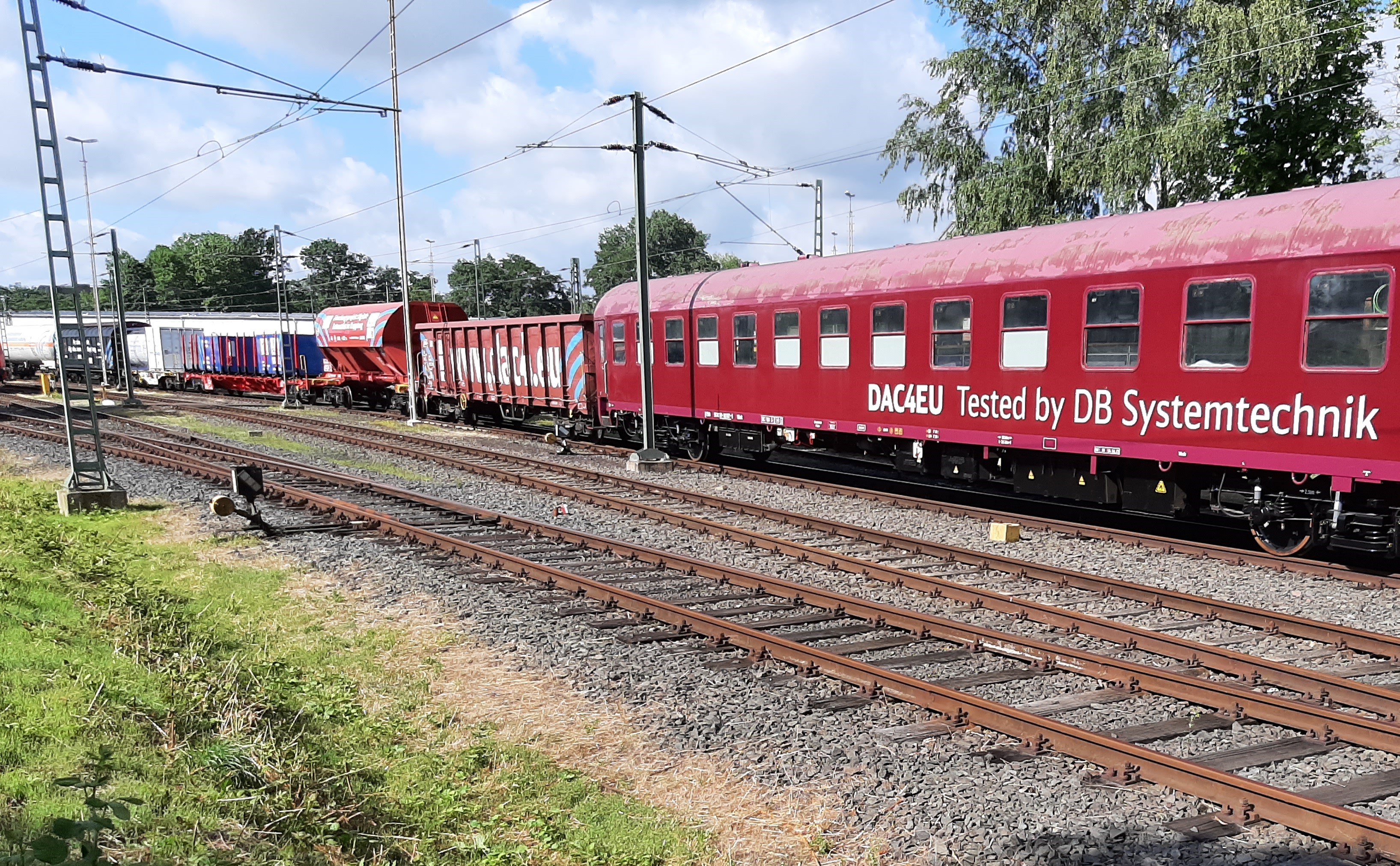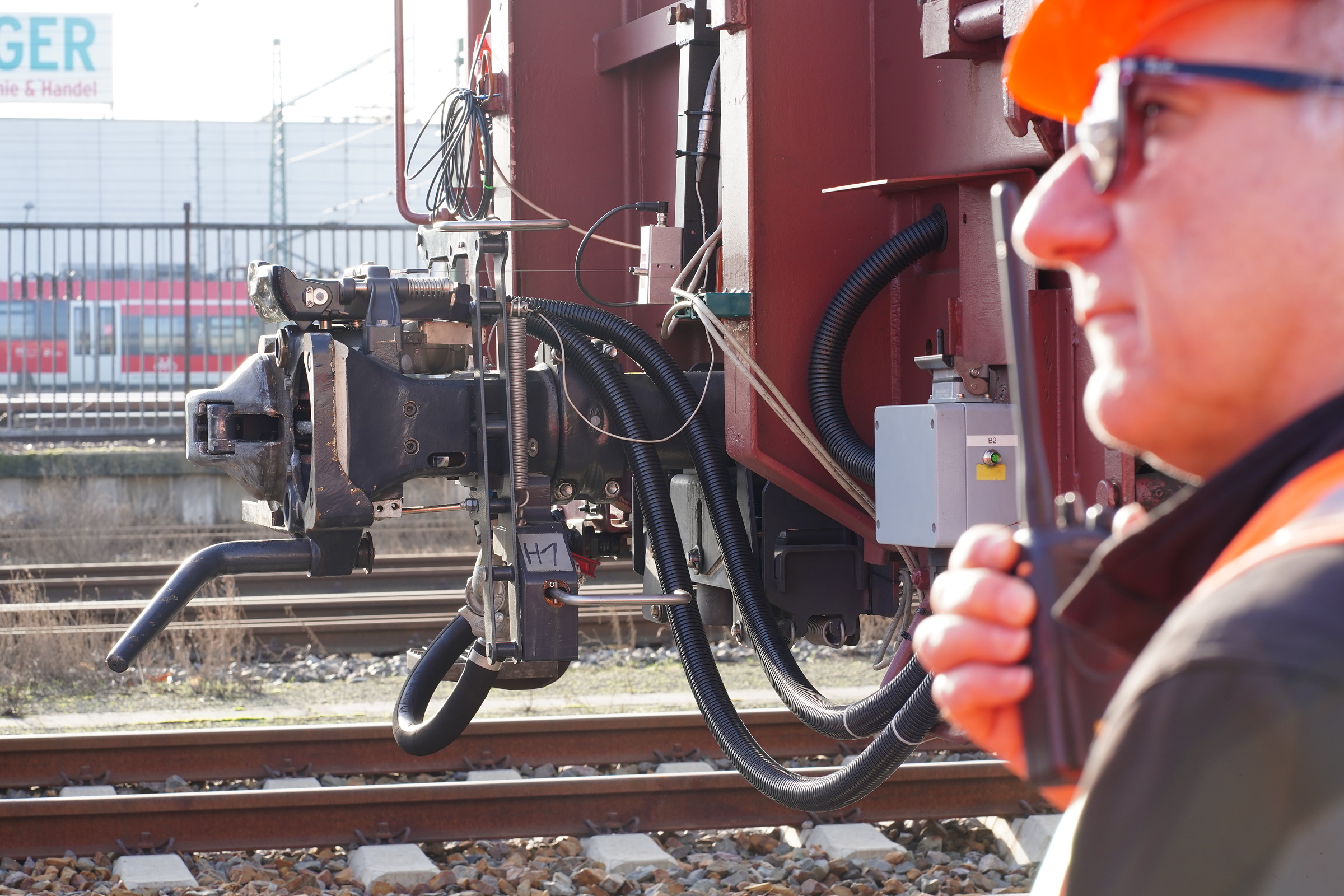Article: DB Systemtechnik heads off to run tests in south-eastern Europe with the DAC4EU demonstrator train
Exciting weeks with extensive tests of the digital automatic coupling (DAC) lie ahead for the DB Systemtechnik team around project manager Alexander Meier-Böke. Working on behalf of the DB Group's DAC programme, the test experts are now going on the move again for several weeks, trialling the DAC test train on railway lines around Europe. Included in the programme this time: EMC tests, shunting procedures, tests for power and data, and running movements.
A higher voltage – for more functionality
One of the aspects set to prove its worth during these tests is the train's new electrical equipment, which has been converted from 110 volts direct current to 400 volts alternating current as per the discussions held at European level. This is designed to facilitate additional digital applications on the freight train of the future, such as freight monitoring and automation functions that require greater power.
First of all, however, the DB Systemtechnik specialists are testing the electromagnetic compatibility (EMC) in Nuremberg-Langwasser. Track-installed switching devices, axle counters – none of this must be disturbed by the DACs or their electrical equipment, and it must all be tested before the new project phase begins.The technical refinements that the manufacturers Voith and Dellner made to the couplings after the second testing phase are being tested as well. The second phase took the DAC4EU test train through Austria, Switzerland, Poland, Czechia, France and Luxembourg in 2022. During this phase the couplings faced various different driving situations, pollution conditions and climatic conditions, for example on the wintry and steep Arlberg railway.
The measurement results collected during these test runs were one factor in the decision to operate the DAC at a higher voltage. The impact that the higher (AC) voltage will have on communications within the train must be investigated during the measurement runs.

DB Systemtechnik uses a separate track geometry car to check the air, power and data lines required for the automatic coupling.
The measurement programme in Austria, Serbia and Hungary
During the tests in Serbia, Hungary and Austria, the DB Systemtechnik team will test all the modified components. At the same time, it will take measurements and look at the digital automatic couplings from the point of view of functionality, brake equipment, service strength, vehicle dynamics, and data and power transmission. It will certainly be another endurance test for the Dellner and Voith couplings.

Supplementary information on the DB Systemtechnik contract
By performing the new test runs, DB Systemtechnik is continuing to fulfil its contract with the DAC4EU consortium. As part of the DAC research project financed by the German Federal Ministry for Digital and Transport, it acts as a testing and engineering service provider engaged in professional testing and measured value acquisition. In addition, it acts as a rail company to coordinate all the journeys involved.
Supplementary information on the European consortium DAC4EU
(Members: Deutsche Bahn, DB Cargo, SBB Cargo, Rail Cargo Austria, Ermewa, GATX Rail Europe and VTG)The European consortium DAC4EU (Digital Automatic Coupling for Europe) is putting the use of the digital automatic coupling (DAC) in rail freight traffic to the test. Six companies from Germany, Austria, Switzerland and France have been awarded a contract by the German Federal Ministry for Digital and Transport (BMDV) to conduct a research project entitled "DAC Demonstration Train for Rail Freight Traffic" ("DAK Demonstrator für den Schienengüterverkehr").
The members of the DAC4EU consortium are Deutsche Bahn and its subsidiary DB Cargo, the Swiss and Austrian freight operating companies SBB Cargo and Rail Cargo Austria, and the wagon keepers Ermewa, GATX Rail Europe and VTG. The research project is funded by the BMDV with about EUR 20 million and has a project duration of 4 years (June 2020 to June 2024).
Further information is available at: www.dac4.eu
